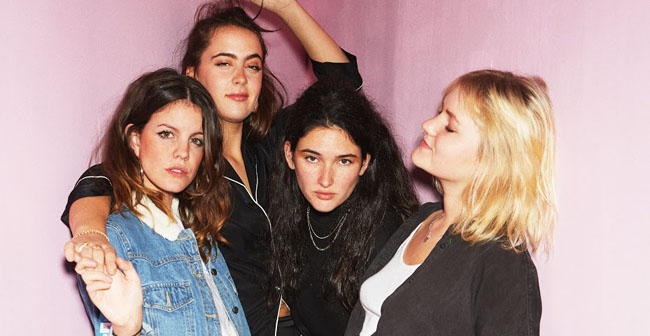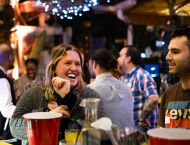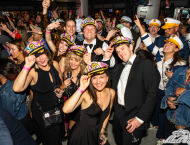Music
 Carlotta Cosials, Ana Perrote, Ade Martin and Amber Grimbergen // Photo: Alberto von Stokkum
Carlotta Cosials, Ana Perrote, Ade Martin and Amber Grimbergen // Photo: Alberto von Stokkum
The Secret World of Hinds, Spain’s Indie Stars
May 8, 2018 @ 12:00am
On the morning I was scheduled to interview Ana Perrote – singer, guitarist and one-fourth of ramshackle Spanish indie rock group Hinds – she messaged me “Hola” before I had even headed into work. I was a few minutes late to hop on the call due to technical difficulties, and when we finally connected (after my profuse apologies) a relaxed Perrote popped up on my screen, perched at a desk on a computer and surrounded by clothes on hangers and drying racks in her room. I commented on her framed Picasso painting, and she proceeded to pan around the room to show all the laundry she was prepared to take on tour, talking to me as if I was an old friend from school and not a total stranger.
This openness and energy Perrote possesses is also so evident in her music as one of Hinds’ primary songwriters, setting them apart in a sea of beach rock revivalists that have popped in and out of the worldwide scene in the past decade. A way with words in conversation and in song, Perrote chatted up Hinds’ new album and tour, working with band idol Gordon Raphael and why no one can truly understand what life is like as a member of Hinds – and that’s a good thing.
On Tap: You’re influenced by Mac DeMarco, Ty Segall and The Strokes – all bands that are contemporaries of yours and still currently put out music. But your overall sound is very cool and retro, so do you consider any older bands to be influences or are you just inspired by these bands who are also reimagining older sounds?
Ana Perrote: We have two faces, almost two different moments in the writing process. When we first started playing together, even when we played covers, we used to play things like Bob Dylan and Creedence Clearwater Revival – older stuff by bands who don’t release music anymore. Then suddenly we discovered Mac DeMarco and The Growlers, and we totally freaked out. It was like, “Oh my God, you can actually write good stuff and be alive!” That’s why we say our influences are those kinds of bands, because it’s actually what you can now be influenced by more, but there’s always the older stuff.
OT: Is there a garage rock scene in Spain, or are you on your own in pioneering your sound there?
AP: It’s not a big scene, but there’s definitely a scene. It’s a really tiny scene, actually. Mainly around six bands, but we’re all friends with each other. Like, “The guy who takes the pictures is dating the bass player of this band.” You know what I mean? So the first time we went to rehearse songs, it was with Diego from The Parrots, who also produced our first record and is from a band from Madrid. It’s not big, but it’s really, really strong.
OT: You and Carlotta Coisals (vocals and guitar) got your start as a band playing covers, and quit playing after a particularly bad show in your hometown. What made you want to not only try again but start playing your own songs?
AP: First of all, we gave two gigs playing covers. One was good and the second was a horrible – really horrible – one. And then there was maybe a year-and-a-half between that and going back to rehearsing. We didn’t play at all after that show, not even a rehearsal. We totally stopped playing because of how bad it felt to give a bad show. During that summer before we started writing, we went to this festival in Spain called Benicassim, which is our favorite festival ever – it’s really really good. Our friends from the scene, Los Nastys, were playing that festival. It was crazy because we were music lovers for so many years and suddenly we have friends in the lineup of a festival that we love. It was the biggest deal, the biggest thing ever in our community. When we came back from that, we were totally drunk off music and emotions. Carlotta used to have a blog, and she was rereading some of the posts she made when we were in the cover band. Then she just texted me, “Hey, are you free tonight? Do you want to play again?” So I drove to her house and we covered a song by Los Nastys, and two weeks later wrote our first song.
OT: What is your songwriting process like? You and Carlotta are the principal songwriters, but how involved is the other half of the band – Ade Martin (bass and backing vocals) and Amber Grimbergen (drums) – in writing?
AP: There’s always two sides to a song. One is the four of us in the rehearsal room, and the other is Carlotta and I trying to find melodies, chords and the rest of the structure. We really prioritize the melodies in our songs, because we’ve had situations where we had great chords and a great drum solo and everything sounded really good but suddenly we can’t find a good melody. Without a melody, you don’t have a song. We would fight because we would bring it home and be like, “Guys, we changed it because we really couldn’t find a good one” and then someone says, “But I love this bass line!” It can get tricky with four people writing, but at the same time it’s more fun and more interesting. I think you can tell with this album that most of the songs started in the rehearsal room, but at the same time, we always say that the good songs are the songs you can actually play with just one guitar while you sing along, so we really want to keep that in mind even when all four of us are writing.
OT: Tell me about working with Gordon Raphael. That must have been surreal since he’s worked with The Strokes in the past and you have cited them as a huge inspiration. How did Hinds’ collaboration with him come about? Did he have any influence on the more polished direction you moved in on this new album?
AP: We chose him because he was a fan of ours back when we had just released two songs. It was only Carlotta and I, and he sent us a Facebook message – this is back when we only had around 100 followers – and said, “Hey guys, I really really like your songs, and I’m going to Primavera Sound. If you guys are going, I would love to meet you there.” We were going just to see bands so we met up with him really quickly. He was really nice and sweet. When we were thinking about this record, we knew that we wanted to make a step by not working with a friend, but with someone who has a [production] background. We thought of him because he would tweet at us and had been keeping track of where Hinds was. We brought him to Madrid and he totally just let us do whatever we wanted. With the way Hinds started, everything is really private and in a close circle. It felt frightening to have someone with a name that we respected getting inside our process. But we write all the songs before we get in the studio, and he was totally cool with us coproducing the album, which was really fun for us.
OT: As a group, you’ve commented that you feel like people don’t give you a lot of credit since you’re an all-girl band. You had such a successful run on your first album and tour, and now have done the same with your second album. Do people continue to treat you that way while recording and touring with the new album, or has it gotten any better?
AP: I think it’s gotten a little bit better, which kind of sucks because it means you have room for so many years [like this]. If you didn’t like Hinds last year, you don’t get Hinds this year. It’s not fair, but I do feel like it’s getting better, because before there was this whole belief that it was bad because we were a new [band]. Maybe now on the second one, it’s just because my hair isn’t longer – there’s always some stupid excuse. We have to fight a 100 percent more that anyone else, and all the time be proving certain things: the way we dress, talk, pose, play, sing and dance. Everything is under watch. It’s way easier to judge us than any other band.
OT: Does that get exhausting after awhile? Do you ever get to a point where you decide to just not think of people judging you, or is it always in the back of your mind? How do you get to a point where you’re all thinking, “Screw them, we’re going to do whatever we want?”
AP: We don’t usually read reviews and things every day. Those specific people’s opinions are not in our day-to-day because we’re just touring and being with our fans, who totally respect us and are the best fans in the world. The worst thing that can happen is that it can actually convince you. It gets to the point where constantly people are telling you things, and you think, “Well, maybe I’m just here because I have boobs!” In the weakest moments, the worst thing that can happen is when those things can actually convince you because of the constant pressure of it, but we’re getting better at [not listening]. It’s really lucky, being a group of four and all experiencing the same problems. It’s really easy for us to talk about it. When I’m feeling down, I have Carlotta telling me the things that I would tell her when she’s down.
OT: Tell me more about this bond that you have with your bandmates. I know you and Carlotta are old friends and you found Ade and Amber through Facebook. What’s it like making music and touring the world as a group of four women?
AP: It has gone from being friends to being sisters, which has its good things because now there’s nothing that can break that, but at the same time, you lose a lot of things because all the time we’re sharing everything. Even when we get to Madrid, the first thing we do is have a beer with each other and our other friends. We love the same things, same people and same places so it gets really exhausting. At the same time, we have something indescribable. The life we have, our whole experience, it’s such a crazy thing for four girls from Madrid. Everything we do is so specific that I think no one in the world would really understand it. You can try to explain it, but not my mom, my best friend, my manager – these people who are still close to it – no one f—ing knows what it is to be in Hinds, the good things and the bad things. And suddenly you share this experience with three different people – it’s just really a sisterhood.
Hinds play U Street Music Hall on Friday, May 11 with Made Violent. Doors and show at 7 p.m. Tickets are $20. All ages.
U Street Music Hall: 1115 U St. NW DC; 202-588-1889; www.ustreetmusichall.com







